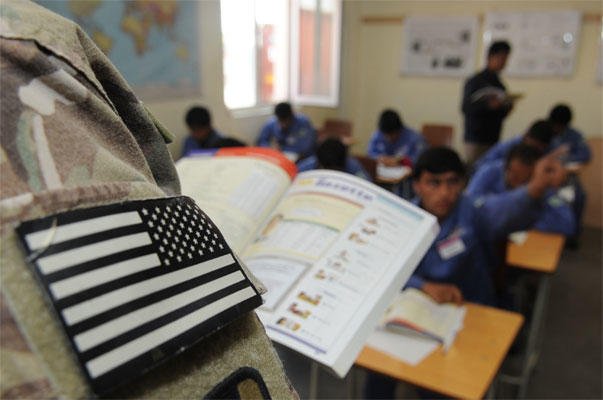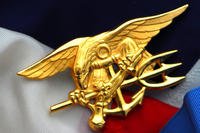BAGRAM AIRFIELD, Afghanistan -- Airmen and Soldiers give lessons in conversational English to Afghan students at the Korean Vocational Training Center here, as part of the effort to create a better future for coalition partners.
Master Sgt. Dean Regazzi, 455th Expeditionary Medical Group first sergeant, coordinated the 51 American servicemembers who volunteered to teach. The instructors themselves, mostly medical personnel, hadn't taught an English class before.
The course, which lasts nine months, has a highly competitive entry process. Of the 300 Afghans applicants, only 130 are selected each time.
Therefore, competition for class seats, combined with the effort required to reach the KVTC results in highly motivated students. It is not rare for several attendees to carpool or bike an hour to get to class.
"They're friendly and outgoing, and they want to learn," said Lt. Col. Sheila Tibbs, 455th Expeditionary Medical Operations Squadron operating room officer in charge.
One thing the instructors quickly learned was how to present the material most effectively. Regazzi said the instructors were put in teams, to show students the variety of accents and dialects English is spoken in.
"We're used to one instructor, and here we are four instructors at one time," Regazzi said.
Vocational instructors, who are fluent in the students' native language, also sit in with the classes.
"It helps to prevent things getting lost in translation," said Maj. Fernando Santana, 455th Expeditionary Medical Support Squadron pharmacy flight commander.
When the current course began a month ago, the class would break up into small groups. This meant the vocational instructor would end up repeating information. Now, the classes stick together for the first part of the lesson, practicing recitations on subjects ranging from explaining where one lives to nicknames.
"It helped us to learn as well," said Senior Airman Nicholas Drake, 455th EMDSS medical logistics technician, "We developed a better way to encompass the whole class rather than splitting off into different groups."
The last part of class, however, consists of the instructors simply speaking naturally to each other or asking the students questions about where they come from or the local area, which they must answer in English.
"The cultural exchange is what drew me in," said Maj. Fernando Santana, 455th Expeditionary Medical Support Squadron pharmacy flight commander. "Not only do they learn from us, but we learn from them."
"They tell me about where they live ... their families and their reasons for wanting to learn English and the vocational skills they're receiving," Santana said. He added that the students aren't different from people of similar age in America.
"They want to make a life for themselves," he said. "They see what they have here as a tremendous opportunity."
Santana added there is even sometimes a reversal where the students will teach the instructors bits of their language.
The ultimate goal is to enable the students to speak English in a conversational manner which, combined with the technical skills they are learning, will improve their chances of finding a job when they go home, said Abdul Karimi, who teaches computer technology at the KVTC.
"It's an international language, and many of students are going to be working with foreigners," Karimi said.
He considers the classes a way to build positive impressions of the international coalition.
"In a way it's fighting from the inside," Regazzi said. "We're showing that we're here to help them."



























